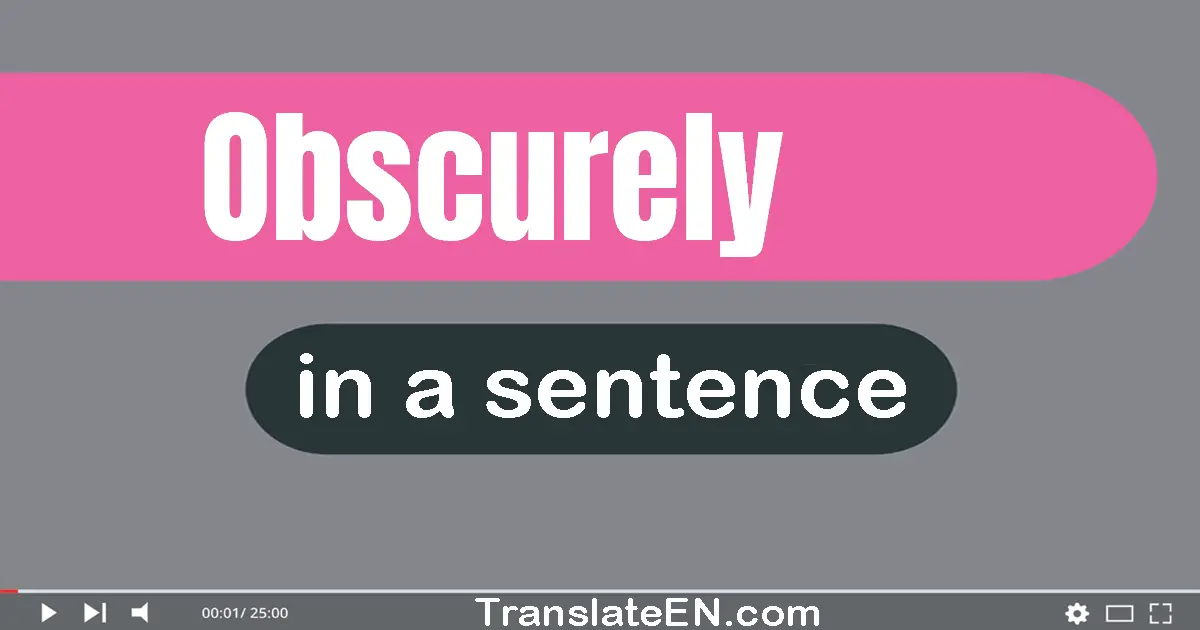Obscurely in a sentence
Synonym: ambiguously. Antonym: clearly
Meaning: In a manner that is not clear or hard to understand.

(1) The meaning of life is often obscurely understood.
(2) The origins of the tradition are obscurely documented.
(3) The path through the dense forest was obscurely marked.
(4) The meaning behind the cryptic message was obscurely hidden.
(5) The hidden passage was obscurely concealed behind a bookshelf.
(6) The hidden treasure was obscurely buried in a remote location.
(7) The meaning of the poem was obscurely hidden in its metaphors.
(8) The ancient ruins were obscurely located deep within the jungle.
(9) The details of the crime were obscurely described by the witness.
(10) The secret code was obscurely embedded within the encrypted message.
Obscurely sentence
(11) The message in the novel was obscurely hinted at throughout the plot.
(12) The truth about the haunted house was obscurely known among the locals.
(13) The ancient text was written in a language that is now obscurely spoken.
(14) The meaning of the dream was obscurely interpreted by the fortune teller.
(15) The meaning of the ancient ritual was obscurely understood by only a few.
(16) The details of the conspiracy were obscurely discussed in hushed whispers.
(17) The significance of the symbol was obscurely referenced in the ancient text.
(18) The clues to the treasure hunt were obscurely scattered throughout the city.
(19) The artist's intention was obscurely conveyed through his abstract painting.
(20) The details of the crime were obscurely revealed in the witness's testimony.
Obscurely make sentence
(21) The artist's intention was obscurely conveyed through their abstract painting.
(22) The truth about the missing treasure was obscurely revealed in a hidden diary.
(23) The significance of the symbol was obscurely referenced in the religious text.
(24) The history of the small town was obscurely recorded in old newspaper clippings.
(25) The true intentions of the politician were obscurely hinted at in their speeches.
(26) The truth about the missing person was obscurely revealed through old photographs.
(27) The true nature of the supernatural phenomenon was obscurely explained in folklore.
(28) The origins of the ancient artifact were obscurely documented in the museum archives.
(29) The significance of the ancient artifact was obscurely mentioned in historical records.
(30) The details of the unsolved mystery were obscurely discussed among conspiracy theorists.
(31) The instructions for the game were obscurely written, causing confusion among the players.
(32) The details of the scientific discovery were obscurely published in a lesser-known journal.
(33) The lyrics of the song were obscurely poetic, leaving the listener to interpret their meaning.
(34) If a metaphor is used too obscurely or cryptically, it can alienate readers or listeners who don't understand the reference.
Obscurely meaning
Obscurely is an adverb that is derived from the adjective "obscure," which means something that is not easily understood or known. When using the word "obscurely" in a sentence, it is important to consider its meaning and context to ensure that it is used correctly. Here are some tips on how to use "obscurely" effectively in your writing:
1. Understand the meaning: Before using the word "obscurely," make sure you have a clear understanding of its definition. It refers to doing something in a way that is not easily understood, seen, or known. This understanding will help you use the word appropriately in your sentence.
2. Context matters: Consider the context in which you are using the word "obscurely." Is it describing an action, behavior, or a situation? Understanding the context will help you choose the right words to accompany "obscurely" and create a coherent sentence.
3. Use it to describe actions: "Obscurely" can be used to describe how someone performs an action in a manner that is not easily understood or noticed.
For example, "He spoke obscurely, leaving the audience puzzled about his intentions." This sentence implies that the person's speech was unclear or ambiguous, making it difficult for the audience to comprehend his message.
4. Describe hidden or concealed information: "Obscurely" can also be used to describe information that is intentionally hidden or concealed. For instance, "The ancient manuscript was written obscurely, with cryptic symbols and hidden meanings." This sentence suggests that the manuscript was written in a way that made it challenging to decipher its true message.
5. Use it to describe a vague or unclear situation: "Obscurely" can be employed to describe a situation that is not easily understood or explained.
For example, "The origins of the mysterious artifact were obscurely documented, leaving historians puzzled." This sentence indicates that the documentation regarding the artifact's origins was unclear or insufficient, leading to confusion among historians.
6. Consider alternative words: While "obscurely" is a suitable choice in many cases, it is essential to consider alternative words that may better convey your intended meaning. Synonyms such as "vaguely," "cryptically," or "enigmatically" can be used interchangeably with "obscurely" to add variety and precision to your writing.
7. Maintain clarity: Although "obscurely" implies a lack of clarity, it is crucial to ensure that your sentence remains clear and understandable. Avoid using the word in a way that confuses the reader or obscures the intended message. Always strive for clarity and coherence in your writing.
In conclusion, "obscurely" is an adverb that describes actions, information, or situations that are not easily understood or known. By understanding its meaning, considering the context, and using it appropriately, you can effectively incorporate "obscurely" into your writing to enhance your expression and convey your intended message.
The word usage examples above have been gathered from various sources to reflect current and historical usage of the word Obscurely. They do not represent the opinions of TranslateEN.com.
